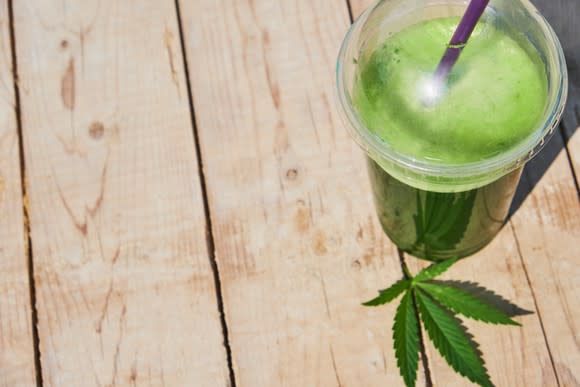Hemp Is on the Brink of U.S. Legalization: Is Canopy Growth Positioned to Profit?
Hemp is on track to being legal across the United States, probably on Jan. 1, 2019, which should spark massive growth in the cannabis space.
Like its cannabis cousin, marijuana, industrial hemp can be used to extract cannabidiol (CBD), a non-psychoactive chemical that has been linked with many wellness benefits. Hemp, however, contains negligible concentrations (less than 0.3%) of tetrahydrocannabinol (THC), the main psychoactive chemical in marijuana.
Some cannabis companies have been positioning themselves to profit from what looks like the imminent legalization of hemp in the U.S. One such company is Canadian grower Canopy Growth (NYSE: CGC), the largest cannabis player by market cap. Let's explore Canopy's activities and potential plans in the hemp arena.

Image source: Getty Images.
Hemp is one step away from U.S. legalization
On Tuesday and Wednesday, the U.S. Senate and House of Representatives, respectively, passed the 2018 Farm Bill. This legislation contains a provision that would make it legal across the country for farmers to grow industrial hemp. Specifically, it removes industrial hemp from the federal government's list of controlled substances. (Currently, it's only legal to grow hemp in certain states, provided a grower possesses a state license.) President Trump is expected to sign the bill by year's end, and possibly any day now.
If or when -- and it seems safe to say "when" -- the current Farm Bill becomes law, the U.S. hemp market should balloon in size. The market for hemp-derived CBD in this country is projected to rocket from about $591 million in annual sales this year to $22 billion by 2022, according to the Brightfield Group. That's a 37-fold increase in four years.
Canopy Growth's business and recent financial results
Canopy Growth grows marijuana and processes it into dried flower and oil products for the medical marijuana market in Canada and some other countries, most notably Germany. It also began selling recreational marijuana products in Canada when that market opened on Oct. 17.
Last month, Canopy reported its fiscal second-quarter 2019 results. Revenue jumped 33% year over year to $23.3 million Canadian, equal to about $18.1 million at that time. Revenue growth was solid, but not spectacular, because the quarter ended more than two weeks before Canada's adult-use market opened. The company's net loss expanded to CA$330.6 million from CA$1.6 million, which translates to a loss per share of CA$1.52, compared with CA$0.01 in the year-ago period. Net (and operating) loss ballooned because Canopy Growth is aggressively investing in growth initiatives -- including in the hemp space.

Image source: Getty Images.
Canopy Growth's hemp activities and potential plans
Canopy's founder, chairman, and co-CEO, Bruce Linton, shared some information on the earnings call about the company's activities and potential plans in the hemp arena. Here are three things you should know.
1. U.S. legalization of hemp will allow Canopy Growth to enter the U.S. market
From Linton's remarks:
[H]emp [legalization] in the U.S. could be sooner than you think. ...
I think hemp [legalization] is going to happen in the U.S.
It's looking as if Linton will be right on both counts. It wasn't long ago that it appeared iffy whether Congress would be able to agree on a Farm Bill before the end of the year. Moreover, it wasn't a given that the provision in the bill that would make it legal on a federal level to grow industrial hemp would be included in a compromised bill.
U.S. legalization of hemp has huge implications for Canopy Growth, along with most of its peers, as it will allow the company is enter the U.S. market. Despite medical and recreational marijuana being legal in a good number of U.S. states, Canopy can't currently enter the U.S. cannabis market because of the stock exchanges the company is listed on, the New York Stock Exchange (NYSE) and the Toronto Stock Exchange (TSE). Both exchanges prohibit their listed companies from engaging in any enterprise in the U.S. that's illegal on a federal level.
2. Canopy is ready to enter the U.S. hemp derived-CBD product market
From Linton's remarks:
I think hemp [legalization] is going to happen in the U.S. When it does, that's not the time to start. You should have already been started up and ramped up and [be] ready to revenue up. We think we are.
Based on Linton's comments, it seems the company is ready to launch hemp-derived CBD products in the U.S. market. With the green flag likely to go up on the U.S. hemp market on Jan. 1, 2019, investors should probably expect some concrete news from Canopy Growth in early 2019.
As to what products the company might release, it seems likely CBD-infused beverages will be on the docket at least eventually. Canopy and its alcoholic beverage giant partner, Constellation Brands, are already developing cannabis-infused beverages for the Canadian market, where they're expected to be legal next year. (Constellation invested $3.8 billion in Canopy in August, increasing its ownership stake to 38%.) For the U.S. market, it makes sense that Canopy would initially release a hemp-derived CBD-infused wellness beverage, rather than an alcoholic beverage. Indeed, Linton suggested as much, as he specifically mentioned "sports drinks."

Image source: Getty Images.
3. Canopy has a "substantial hemp operation" in Canada and has IP around managing hemp
From Linton's remarks:
[W]e have a substantial hemp operation that we've been working on in Canada. We have intellectual property that we've developed around how to manage hemp.
Canopy has been farming hemp in Canada and has developed intellectual property (IP) in the hemp space, including "processes involving [CBD] extraction," Linton said. His comments suggest that a good portion of the company's core hemp IP was obtained from its acquisition of Saskatchewan-based Green Hemp Industrie, which closed in January. He didn't name the company, but a Google search based on his comments indicate that he was referring to Green Hemp. According to the press release announcing the deal:
[Green Hemp founder and owner Jason] Green has developed an optimized process to grow, harvest, collect, and extract the whole hemp plant at field-scale and in a fashion that meets a high standard for product quality.
In late November, Canopy closed on another hemp acquisition. It bought Colorado-based ebbu. Canopy claims that Ebbu's IP has the potential to enable it to "vastly reduce the cost of CBD production" from its hemp operation in Saskatchewan.
In short, Canopy Growth appears well positioned to be a leader in the hemp-derived CBD product space in the U.S. It certainly has a huge cash advantage relative to its peers, thanks to the Constellation investment. But it's too early to tell how management will execute on its plans.
More From The Motley Fool
Beth McKenna has no position in any of the stocks mentioned. The Motley Fool recommends Constellation Brands. The Motley Fool has a disclosure policy.

 Yahoo Finance
Yahoo Finance 